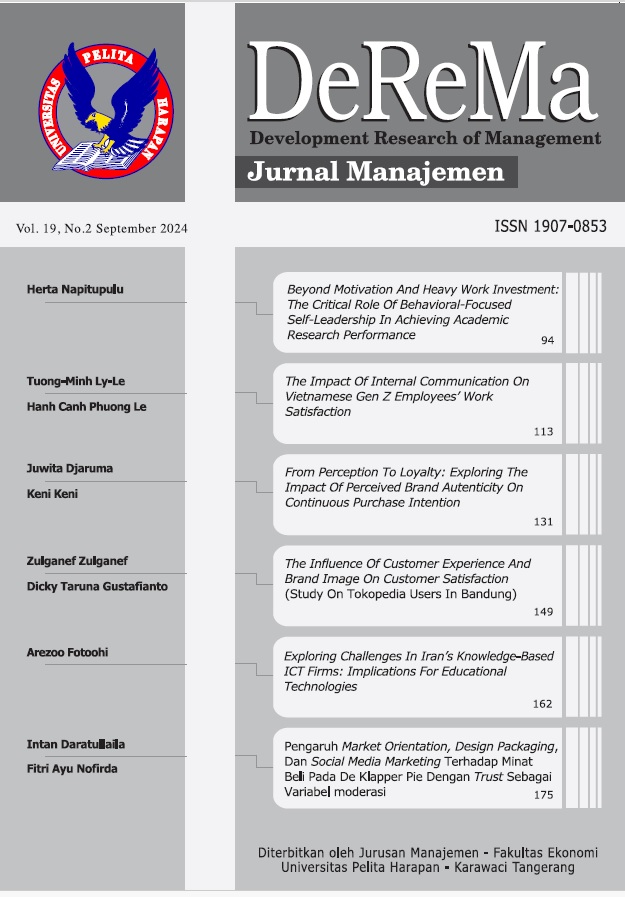EXPLORING CHALLENGES IN IRAN'S KNOWLEDGE-BASED ICT FIRMS: IMPLICATIONS FOR EDUCATIONAL TECHNOLOGIES
DOI:
https://doi.org/10.19166/derema.v19i2.8623Trefwoorden:
ICT Sector, Growth Challenges, Knowledge-Based Firms (KBFs), Iranian Market, Regulatory BarriersSamenvatting
This study explores the multifaceted growth challenges faced by Knowledge-Based Firms (KBFs) within Iran’s Information and Communication Technology (ICT) sector. The research identifies critical barriers across several domains, including financial constraints, market development limitations, and political, regulatory, and legal complexities. Through a comprehensive analysis, the study reveals that financial challenges are intensified by limited access to high-quality equipment and skilled personnel. Additionally, both domestic and international market development face significant hurdles. Regulatory and legal issues, such as inadequate intellectual property protections and cumbersome administrative processes, further exacerbate these challenges. The study underscores the need for strategic policy reforms, improved governmental coordination, and targeted support mechanisms to address the evolving needs of these firms. The findings highlight the importance of optimizing tax policies, facilitating international market entry, revising regulatory frameworks, and enhancing support for knowledge-based law enforcement to foster sustainable growth and innovation in Iran’s ICT sector.
Abstrak dalam Bahasa Indonesia. Penelitian ini mengeksplorasi tantangan pertumbuhan yang kompleks yang dihadapi oleh Perusahaan Berbasis Pengetahuan (KBFs) dalam sektor Teknologi Informasi dan Komunikasi (ICT) di Iran. Penelitian ini mengidentifikasi hambatan kritis di berbagai bidang, termasuk keterbatasan keuangan, keterbatasan pengembangan pasar, serta kompleksitas politik, regulasi, dan hukum. Melalui analisis yang komprehensif, penelitian ini mengungkapkan bahwa tantangan keuangan diperparah oleh terbatasnya akses terhadap peralatan berkualitas tinggi dan tenaga kerja terampil. Selain itu, pengembangan pasar domestik dan internasional menghadapi hambatan yang signifikan. Masalah regulasi dan hukum, seperti perlindungan hak kekayaan intelektual yang tidak memadai dan proses administratif yang rumit, semakin memperburuk tantangan ini. Penelitian ini menekankan perlunya reformasi kebijakan strategis, peningkatan koordinasi pemerintah, dan mekanisme dukungan yang tepat untuk mengatasi kebutuhan yang berkembang dari perusahaan-perusahaan ini. Temuan ini menyoroti pentingnya mengoptimalkan kebijakan pajak, memfasilitasi masuknya pasar internasional, merevisi kerangka regulasi, dan meningkatkan dukungan untuk penegakan hukum berbasis pengetahuan guna mendorong pertumbuhan yang berkelanjutan dan inovasi dalam sektor ICT di Iran
Referenties
Akbarzadeh, N., & Shafizadeh, A. (2011). Investigating the role of the government in improving the process of creating and developing knowledge-based businesses. Roshd-E-Fanavari, 9(33), 61-55.
Ameen, N., & Willis, R. (2016). Current and future challenges facing the mobile telecommunications industry in the Arab world. International Journal on Embedded Systems, 4, 1-6.
Anderson, C. (2012). The hidden internet of Iran: Private address allocations on a national network. arXiv preprint arXiv:1209.6398. https://doi.org/10.48550/arXiv.1209.6398
Askari, A. (2019). Absorption capacity model in knowledge based defense organizations with futuristic approach. Defensive Future Studies, 4(13), 143-168.
Camisón-Haba, S., Clemente-Almendros, J. A., & Gonzalez-Cruz, T. (2019). How technology-based firms become also highly innovative firms? The role of knowledge, technological and managerial capabilities, and entrepreneurs’ background. Journal of Innovation & Knowledge, 4(3), 162-170. https://doi.org/10.1016/j.jik.2018.12.001
Davari, A., & Farkhmanesh, T. (2016). Effect of entrepreneurship policies on the establishment and development of knowledge-based ICTs businesses. Iranian Journal of Information Management, 2(3),1-23.
Falahdoost, A. (2020). Legal protection of KBFs. New Research in Human Sciences, 61(4), 244-260.
Farnoodi, S., Ghazinoory, S., Radfar, R., & Tabatabaian, S. H. (2020). Governmental origin: Why NTBFs grow in a transitional economy. Economic research-Ekonomska istraživanja, 33(1), 379-398. https://doi.org/10.1080/1331677X.2019.1674173
Fartash, K., Dehghanpir, A., & Saremi, M. S. (2021). An analysis on policy requirements to strengthening the local content of ICT equipment in Iran. Rahyaft, 31(2), 47-64.
Fartash, K., Baramaki, T., Saremi, M. S., & Sadabadi, A. A. (2022). The growth challenges of pioneer KBFs of ICT. Journal of Science and Technology Policy, 15(3), 41-54.
Ghasseminejad, S., & Jahan-Parvar, M. R. (2021). The impact of financial sanctions: The case of Iran. Journal of Policy Modeling, 43(3), 601-621. https://doi.org/10.1016/j.jpolmod.2021.03.001
Ghazinoori, S., Bamdad Soofi, J., & Radaei, N. (2017). A framework for selecting financing instruments based on KBFs clustering. Journal of Science and Technology Policy, 10(2), 13-30.
HamidiMotlagh, R., Babaee, A., Maleki, A., & Taghi Isaai, M. (2020). Innovation policy, scientific research and economic performance: The case of Iran. Development Policy Review, 38(3), 387-407. https://doi.org/10.1111/dpr.12423
Haridan, N. M., Hassan, A. F. S., & Alahmadi, H. A. (2020). Financial technology inclusion in Islamic banks: Implication on Shariah compliance assurance. International Journal of Academic Research in Business and Social Sciences, 10(14), 38-48. http://dx.doi.org/10.6007/IJARBSS/v10-i14/7361
Heshmati, A. (2001). On the growth of micro and small firms: Evidence from Sweden. Small business economics, 17, 213-228. https://doi.org/10.1023/A:1011886128912
Hoshdar, F., Soltani , B., Fasihi , S., & Naseemeh, T. (2019). Presenting an improved classification model of KBFs in Iran. Strategic Studies of Public Policy, 9(30), 215-233.
Ibitoye, O. (2018). An evaluation of challenges facing small and medium scale enterprises in nigeria and suggested solutions: Further evidence from Ekiti State. Available at SSRN 3309685. https://doi.org/10.2139/ssrn.3309685
Inyang, U., & Okonkwo, I. V. (2021). Information and communication technology in Nigeria insurance industry: Developments, challenges and prospects. Journal of Economics, Finance and Management Studies, 4(07), 1159-1171. https://doi.org/10.47191/jefms/v4-i7-28
Jalalpour, S., Talebi, K., & Tabibi , J. (2016). Performance improvement of Iranian knowledge based firm: Identify effective factors in policies and executive programs. Entrepreneurship Development, 9(2), 199-27. https://doi.org/10.22059/jed.2016.60457
Jensen, A., & Clausen, T. H. (2017). Origins and emergence of exploration and exploitation capabilities in new technology-based firms. Technological Forecasting and Social Change, 120, 163-175. https://doi:10.1016/j.techfore.2017.03.004
Kashani, E. S., Talebi, S., & Eskandari, V. A. A. (2014). Exploring the organizational capabilities of four knowldege-based firms in the technology’s incubator of sharif university. Journal of, 6(3).
Mansuri, S., Vazifeh, Z., & Yusefi Tabas, H. (2017). Prioritizing the effective factors in the development of KBFs of Kerman. Journal of Entrepreneurship Development, 10(2), 319-338.
Mohan, V., & Ali, S. (2019). Challenges faced by Indian MSMES in adoption of internet marketing and e-commerce. Academy of Marketing Studies Journal, 23(1), 1-9.
Montazeri, E., Movadinia, N., & Talebi, H. (2016). Challenges and obstacles in the implementation of comprehensive information and communication technology plans in organizations. Smart Business Management Studies, 5(18), 105-136. https://doi.org/10.22054/ims.2017.7013
Moradipour, R. (2013). Presenting the success model of KBFs. The second international technology commercialization conference. Iran University of Science and Technology.
Naghizade, R., & Namdarian, L. (2019). The suppotive policies for new technology-based firms (NTBF's). Journal of Science and Technology Policy, 12(2), 285-296.
Naghizadeh, R. (2021). A historical narrative of the pattern of formation and development of empowerment services for new KBFs in the innovation and prosperity fund. Journal of Improvement Management, 15(3), 221-239. https://doi.org/10.22034/JMI.2021.294417.2611
Odubiyi, T. B., Aigbavboa, C. O., & Thwala, W. D. (2019, November). Information and communication technology application challenges in the construction industry: A narrative review. In IOP conference series: Materials science and engineering ,640(1), 012025. IOP Publishing. https://doi.org/10.1088/1757-899X/640/1/012025
Ogbuabor, J. E., Eigbiremolen, G. S. O., Orji, A., Manasseh, C. O., & Onuigbo, F. N. (2020). ICT and financial inclusion in Nigeria: An overview of current challenges and policy options. Nigerian Journal of Banking and Finance, 12(1), 90-96.
Qolipour, M., Vahdatzad , M., Olya , M., & Khademi Zare , H. (2015). Identifying and prioritizing the challenges of KBFs using the artificial neural network method (Case study: Yazd KBFs). Roshd-E-Fanavari, 12(45), 17-25.
Rafsanjani Nejad, S. (2015). Pathology of the law to support KBFs and institutions from the perspective of executive mechanisms. Center for Presidential Strategic Studies.
Rehman, A., Ozcan, R., Badshah, W., Radulescu, M., & Ozturk, I. (2021). Symmetric and asymmetric impacts of commercial energy distribution from key sources on economic progress in Pakistan. Sustainability, 13(22), 12670. https://doi.org/10.3390/su132212670
Saleem, F., Salim, N., Altalhi, A. H., Abdullah, A. L., Ullah, Z., Baothman, F. A., & Junejo, M. H. (2016). Comparative study from several business cases and methodologies for ICT project evaluation. International Journal of Advanced Computer Science & Applications, 1(7), 420-427. https://dx.doi.org/10.14569/IJACSA.2016.070654
Salehi, M., & Alipour, M. (2010). E-banking in emerging economy: Empirical evidence of Iran. International Journal of economics and finance, 2(1), 201-209. https://doi.org/10.5539/ijef.v2n1p201
Shukaili, A. A., Cucculelli, M., González-PernÃa, J. L., & Legazkue, I. P. (2018). Entrepreneurship policy to overcome barriers to new firm growth in a developing economy: Evidence from Oman. International Journal of Entrepreneurship and Small Business, 35(4), 511-537. https://doi.org/10.1504/IJESB.2018.096173
Suwannaporn, P., & Speece, M. W. (2010). Assessing new product development success factors in the Thai food industry. British Food Journal, 112(4), 364-386. https://doi.org/10.1108/00070701011034394
Tavakkol, M., & Ghazinouri Naeini, R. (2010). Diffusion and obstacles to ICT adoption in Iranian industries: Case study of selected sectors. Journal of Science and technology policy, 3(3), 31-45. https://doi.org/20.1001.1.20080840.1389.3.2.4.6
Valibeigi, M., Mohammadi, A., Valibeigi, M., & Zameni, A. (2020). A framework for knowledge-based enterprise financial support in Iran. Global Economics Science, 50-55. https://doi.org/10.37256/ges.12202086
Yadollahi Farsi, J., & Toghraee, M. T. (2014). Identification the main challenges of small and medium sized enterprises in exploiting of innovative opportunities (Case study: Iran SMEs). Journal of Global Entrepreneurship Research, 4, 1-15. https://doi.org/10.1186/2251-7316-2-4
Zarei, B., & Marjovi, A. (2018). Strategic internationalization of knowledge based new ventures in Iran: A longitudinal case study aiming at creation of actionable knowledge. Journal of Science and Technology Policy, 11(2), 29-46. https://doi.org/10.22034/jstp.2018.10.2.539482
##submission.downloads##
##submission.additionalFiles##
Gepubliceerd
Nummer
Sectie
Licentie
Authors who publish with this journal agree to the following terms:
1) Authors retain copyright and grant the journal right of first publication with the work simultaneously licensed under a Creative Commons Attribution License (CC-BY-SA 4.0) that allows others to share the work with an acknowledgement of the work's authorship and initial publication in this journal.
2) Authors are able to enter into separate, additional contractual arrangements for the non-exclusive distribution of the journal's published version of the work (e.g., post it to an institutional repository or publish it in a book), with an acknowledgement of its initial publication in this journal.
3) Authors are permitted and encouraged to post their work online (e.g., in institutional repositories or on their website). The final published PDF should be used and bibliographic details that credit the publication in this journal should be included.





